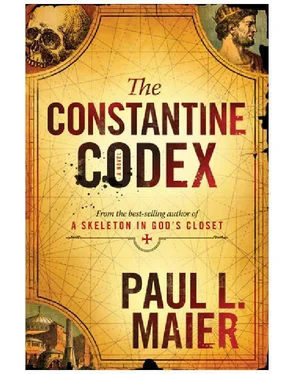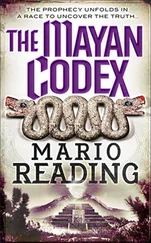Paul Maier - The Constantine Codex
Здесь есть возможность читать онлайн «Paul Maier - The Constantine Codex» весь текст электронной книги совершенно бесплатно (целиком полную версию без сокращений). В некоторых случаях можно слушать аудио, скачать через торрент в формате fb2 и присутствует краткое содержание. Жанр: Триллер, на английском языке. Описание произведения, (предисловие) а так же отзывы посетителей доступны на портале библиотеки ЛибКат.
- Название:The Constantine Codex
- Автор:
- Жанр:
- Год:неизвестен
- ISBN:нет данных
- Рейтинг книги:5 / 5. Голосов: 1
-
Избранное:Добавить в избранное
- Отзывы:
-
Ваша оценка:
- 100
- 1
- 2
- 3
- 4
- 5
The Constantine Codex: краткое содержание, описание и аннотация
Предлагаем к чтению аннотацию, описание, краткое содержание или предисловие (зависит от того, что написал сам автор книги «The Constantine Codex»). Если вы не нашли необходимую информацию о книге — напишите в комментариях, мы постараемся отыскать её.
The Constantine Codex — читать онлайн бесплатно полную книгу (весь текст) целиком
Ниже представлен текст книги, разбитый по страницам. Система сохранения места последней прочитанной страницы, позволяет с удобством читать онлайн бесплатно книгу «The Constantine Codex», без необходимости каждый раз заново искать на чём Вы остановились. Поставьте закладку, и сможете в любой момент перейти на страницу, на которой закончили чтение.
Интервал:
Закладка:
In the case of Muhammad, Jon felt it was high time to reexamine his life story in detail. Unfortunately this was more difficult than in the case of Jesus, since the first definitive biographies of Muhammad were not written until 150 years after his death. The Gospel accounts of the life of Jesus were written within a generation.
Another matter galled Jon. Some years previous, a self-appointed pundit had published a list of the greatest or most influential people who ever lived, at least in his opinion. Jon was chagrined to find that Muhammad, not Jesus, was number one. Why? Because Christianity was cofounded by Jesus and St. Paul, it was claimed. Jesus had to share the honors, whereas Muhammad was the single founder of Islam. Never mind that Christianity had-and has-twice the following.
Unquestionably, though, Muhammad was an extraordinary personality, and his life story was fully unique. Born in Mecca circa 570-though that date was disputed-Muhammad claimed to trace his lineage back to Abraham’s firstborn, Ishmael. Muhammad’s father died before he was born, and his mother when he was only six years old. The orphan shepherd boy was raised by an uncle and early developed attractive moral traits such as never telling a lie, caring for those in need, and managing fiscal accounts with total honesty and reliability. In directing caravan operations for a wealthy widow named Khadijah, he did so well that she ultimately married him, despite being fifteen years his senior.
Jon especially noted that Muhammad was also a meditative and mystic sort who left his family for days at a time for meditation in favorite caves near Mecca, where he experienced dreams and visions. Around 610, when Muhammad was about forty-so his final wife, Aisha, reported-Muhammad was sitting at the mouth of a cave named Hira when a luminous being-he later claimed it was the angel Gabriel-seized him by the throat and commanded him to read.
“I cannot read!” Muhammad replied, for indeed, he was illiterate.
“O Muhammad, read!” Gabriel said a second time.
Again Muhammad responded, “I cannot read!”
When this happened a third time, the angel embraced him so tightly that he could not breathe. Finally he released him and said, “O Muhammad, give utterance: Allah is God, and you are his Prophet!” Additional revelations followed.
Muhammad was understandably shocked, and he wondered if the revelations were genuine. He had his doubts and expressed them to Khadijah. What if an evil spirit or jinn had seized him and these were not the words of the Lord communicated through Gabriel? Worse yet, what if they were satanic? That the revelations ceased for a time only compounded the problem.
At that moment, Jon realized, the future of Islam-and much subsequent world history-hung in the balance. Had Khadijah sided with his doubts, Islam would never have existed. Instead, however, she firmed him up with the assurance that the revelations came from God himself, and that he should be obedient to them.
Muhammad was persuaded, and Islam was born. He preached this revelation on the streets of Mecca. Against the rampant polytheism of the many desert tribes in Arabia, the new Prophet announced that God was one -not many-and that Muhammad himself was the one he appointed to proclaim this message.
At first, few paid him any heed, not even relatives or members of his own Quraish tribe. He was called crazy, a liar, and a sorcerer, and once, while he was at prayer, dung and bloody camel intestines were dropped onto his back-until removed by his daughter Fatima. His small following was scorned by the wealthy merchants who controlled the city government at Mecca. They were particularly worried that Muhammad’s new teaching would undermine all the pilgrimages that took place to visit the great Kaaba situated at the center of Mecca. That black rock was home to the many desert spirits of Arab polytheism, and its sacredness would be doomed were people to believe Muhammad’s message.
Still, more and more people in Mecca were accepting Muhammad’s message, and so the merchants now decided on a violent solution. Warned in time, Muhammad and his companions, or disciples, fled from Mecca to Medina, some two hundred miles due north of Mecca. The flight, called the Hijirah, took place in 622, which became year one in the Muslim calendar.
The people of Medina, not controlled by a merchant aristocracy, eagerly accepted Muhammad’s message, and the first mosque was built there. Now he could deal from a position of growing political strength. The pagan Quraish in Mecca tried to halt the spread of Islam by military action, and Islam’s first battle took place at Badr, an oasis halfway between Mecca and Medina. Although outnumbered 1,000 to 314, the Muslim forces were victorious. Further battles took place over the next eight years, until Muhammad was able to command an army of ten thousand, which advanced on Mecca. When the dust settled, the Meccans, tired of war, accepted Muhammad, especially in view of his promise to give the Kaaba a major future role in Islam.
He entered Mecca triumphantly in 630 and formally cleansed the Kaaba of its evil spirits. Then he made it an obligation for every Muslim at least once in a lifetime to make a pilgrimage to Mecca to visit the Kaaba, if physically and financially able. Jon knew that if he himself were a Muslim and made the hajj-the pilgrimage-he could thenceforth be known as Jonathan Hajji-Weber.
Muhammad issued a general amnesty to his opponents in Mecca, which only added to his reputation, and a firestorm of conversion to Islam swept across Arabia. The polytheistic desert tribes had been looking for something to unite them, and Muhammad now provided that.
But his own lifestyle seemed to go beyond his teachings, Jon noted. His male followers were limited to no more than four wives-actually making something of a women’s liberator of Muhammad, strange as that may seem, since previously there had been no limit to the number of wives a man might have. But did Muhammad limit himself to four? He was faithful to Khadijah for as long as she lived, but when she died, the Prophet married no fewer than eleven other wives. One of them, Zainab, had been the wife of an adopted son, who willingly stepped aside when he learned of the Prophet’s interest in her. Muhammad’s last wife-little Aisha-was just six years old when he married her, but nine when the marriage was consummated. And it was in her arms that the sixty-three-year-old Prophet died at Medina in 632, where he was also buried.
Jon now pondered a dilemma. How many of the questionable details in Muhammad’s life would be off-limits for discussion in the debate because, were they discussed, they could cause riots worldwide? In contrast, he thought wryly of all the current attacks on Jesus and the church that he founded. In the world’s new double standard, evidently it was politically correct to attack only Christianity but no other religion on earth. Not fair. Not fair at all.
Imagine if a distorting book like The Da Vinci Code had targeted Muhammad instead of Jesus. The fatwa imposed on the author would have been far more lethal than was his, Jon knew-at least to date. In Christianity, at least, multiple targets-like Jesus, Paul, Peter, John, or Luke-helped cushion the attack. In Islam, there was only one person and one book: Muhammad and the Qur’an. Both were regarded by pious Muslims with sacrosanct awe and were barred to criticism of any kind. He was preparing for a debate with the cards stacked against him, Jon finally realized.
While Muhammad’s wives should have been fair game in the forthcoming debate, Jon wondered whether to play that card. He knew the Muslim response. The marriages were conducted for political and social reasons, such as to give protection for women in need of such; most of the women were nonvirgins-if that could be considered justification-and Henry VIII’s reason: Muhammad wished to have a son. And of course, al-Rashid would raise an even more obvious precedent: the polygamy among Old Testament leaders. Solomon, after all, made Muhammad look like a master of restraint when it came to wives.
Читать дальшеИнтервал:
Закладка:
Похожие книги на «The Constantine Codex»
Представляем Вашему вниманию похожие книги на «The Constantine Codex» списком для выбора. Мы отобрали схожую по названию и смыслу литературу в надежде предоставить читателям больше вариантов отыскать новые, интересные, ещё непрочитанные произведения.
Обсуждение, отзывы о книге «The Constantine Codex» и просто собственные мнения читателей. Оставьте ваши комментарии, напишите, что Вы думаете о произведении, его смысле или главных героях. Укажите что конкретно понравилось, а что нет, и почему Вы так считаете.












